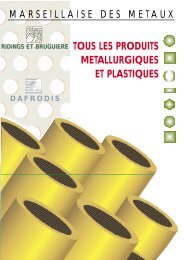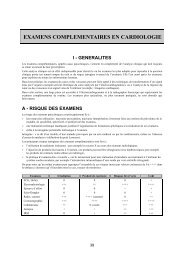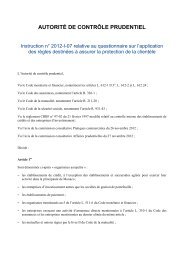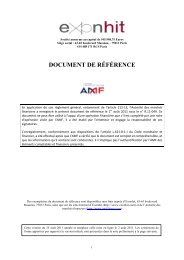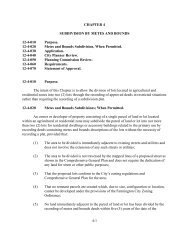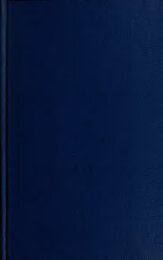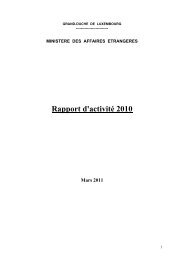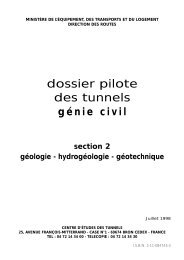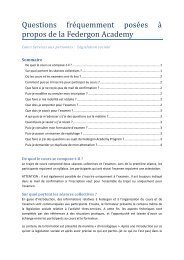- Page 1 and 2: Université de MontréalThe Career
- Page 3 and 4: Abstracti
- Page 5 and 6: iiiresidues of which manifest sympt
- Page 9 and 10: viiTable of ContentsAbstract……
- Page 11 and 12: Acknowledgementsix
- Page 13 and 14: xiA throw of the dice will never ab
- Page 15 and 16: 2In fact, the history of Western th
- Page 17 and 18: 4allows the intrusion of the trauma
- Page 19 and 20: 6A constellation of concepts and tr
- Page 21 and 22: 8a series of philosophical/existent
- Page 23 and 24: 10will try to provide an explanatio
- Page 25: 12of the real” suggests an inextr
- Page 29 and 30: 16Fundamental Concepts 61), the rei
- Page 31 and 32: 18discourse may seem to be freely a
- Page 33 and 34: 20is perceived as unknowableness th
- Page 35 and 36: 22Thing and the uncanny in my treat
- Page 37 and 38: 24of the Puritan fathers. It is the
- Page 39 and 40: 26that are at once both transgressi
- Page 41 and 42: 28approaching an originary traumati
- Page 43 and 44: 30essential to note that the obsess
- Page 45 and 46: 32later on, the post activity, susp
- Page 47 and 48: Chapter 1The Dialectics of the Tuch
- Page 49 and 50: 36by the place the main signifierth
- Page 51 and 52: 38narrative is explained by Caruth
- Page 53 and 54: 40repeat 11 because it is only in m
- Page 55 and 56: 42writing/reading itself. The misse
- Page 57 and 58: 441.1 The Game of Difference/Diffé
- Page 59 and 60: 46This suspension between disfigura
- Page 61 and 62: 48Derrida demonstrates that “Anas
- Page 63 and 64: 50DeSalvo’s analysis of the narra
- Page 65 and 66: 52said to be consolidated by such r
- Page 67 and 68: 54When Derrida says that a letter c
- Page 69 and 70: 56evil eye is enigmatically visible
- Page 71 and 72: 58The question the letter brings in
- Page 73 and 74: 60enables us to better grasp the d
- Page 75 and 76: 62(45). Performative as it is, the
- Page 77 and 78:
64primal scenes that haunted the Wo
- Page 79 and 80:
66attempt to have access to the pas
- Page 81 and 82:
68a missed encounter, an impossible
- Page 83 and 84:
70the disease in his own eye and he
- Page 85 and 86:
72father“thou wilt not reveal his
- Page 87 and 88:
74The dynamics of this incorporatio
- Page 89 and 90:
76remnants of an unknown past that
- Page 91 and 92:
78threat of patriarchy. Although He
- Page 93 and 94:
80coherence to the subject. The sca
- Page 95 and 96:
82production which engenders a disc
- Page 97 and 98:
84The objet a is a Thing that is re
- Page 99 and 100:
86Scarlet Letter is to see, without
- Page 101 and 102:
88Hester’s shame although the wor
- Page 103 and 104:
90attempt to decipher it. Although
- Page 105 and 106:
921.3. Correspondence of Drives: Tr
- Page 107 and 108:
94excessively cathectedan excess of
- Page 109 and 110:
96inhabits silence, absence, and al
- Page 111 and 112:
98in anticipation of Derridean theo
- Page 113 and 114:
100primal scene poses an answer to
- Page 115 and 116:
102the sense of a return of the rep
- Page 117 and 118:
104over to a new authorthe ghost. T
- Page 119 and 120:
106other within oneself in a safe c
- Page 121 and 122:
108father. For mourning to be possi
- Page 123 and 124:
110specifics of Hawthorne’s spect
- Page 125 and 126:
112American national identity. The
- Page 127 and 128:
114effect of the drives that try to
- Page 129 and 130:
116ambivalence and doubt. Derrida a
- Page 131 and 132:
118relations or formations called t
- Page 133 and 134:
120materializes a certain symbolic
- Page 135 and 136:
122“with his own ghostly hand, th
- Page 137 and 138:
124exerting my fancy, sluggish with
- Page 139 and 140:
126ties his life with his father’
- Page 141 and 142:
The uncanny double is clearly an in
- Page 143 and 144:
130lost by the subject who is, foll
- Page 145 and 146:
132would seem that “dédoubler”
- Page 147 and 148:
134automaton, of repetitionthen, in
- Page 149 and 150:
136emphasis, amounting to a moralis
- Page 151 and 152:
138starts with “call me Ishmael
- Page 153 and 154:
140writing. In this relationship th
- Page 155 and 156:
142economy, the life of the double.
- Page 157 and 158:
144Whale as “a broad white shadow
- Page 159 and 160:
146narrative, is beyond the scope o
- Page 161 and 162:
148special lunacy stormed his gener
- Page 163 and 164:
150One of the main purposes of this
- Page 165 and 166:
152of the missed encounter, but als
- Page 167 and 168:
154existential abyssAhab and Pip co
- Page 169 and 170:
156The painting represents and repr
- Page 171 and 172:
158the primal scene of experience a
- Page 173 and 174:
160metaphysical, but we are left wi
- Page 175 and 176:
162narrative investment in the Goth
- Page 177 and 178:
164the ego and the double, there is
- Page 179 and 180:
166description. My object here is s
- Page 181 and 182:
168prosopopeia. Melville multiplies
- Page 183 and 184:
170origin, the lost referent, which
- Page 185 and 186:
172diffusion of arrival (i.e., psyc
- Page 187 and 188:
174Likewise, the White Whale is inv
- Page 189 and 190:
176Castaway” is Pip’s obituary
- Page 191 and 192:
178hieroglyphic marks, inscrutable
- Page 193 and 194:
180Considered a prosopoetic surplus
- Page 195 and 196:
182The relationship between signs n
- Page 197 and 198:
184reversed into presence and that
- Page 199 and 200:
186lurks in all things, else all th
- Page 201 and 202:
188is helical. The recurrent refere
- Page 203 and 204:
190exchange of positions. Ahab, the
- Page 205 and 206:
192narcissistic melancholia. In oth
- Page 207 and 208:
194Like Adam and Eve’s expulsion
- Page 209 and 210:
1962.3 The De-centered Center and t
- Page 211 and 212:
198between sender and receiver is t
- Page 213 and 214:
200most fatal casualties … you mu
- Page 215 and 216:
202this. This is the book’s motto
- Page 217 and 218:
204In fact, this name becomes an an
- Page 219 and 220:
206revelations and allusions of all
- Page 221 and 222:
208absence. Why do we need the conc
- Page 223 and 224:
210the mother and the other keeps l
- Page 225 and 226:
212figures in the novel. It’s con
- Page 227 and 228:
214structured around ambivalence, u
- Page 229 and 230:
216narrative. The rose becomes the
- Page 231 and 232:
218genital symbol” (235), literat
- Page 233 and 234:
220recovering a romanticized ideali
- Page 235 and 236:
222manifestation of everything that
- Page 237 and 238:
Chapter 3Historicizing the Missed E
- Page 239 and 240:
226Hieroglyphics: The Symbol of the
- Page 241 and 242:
228revisited certain psychoanalytic
- Page 243 and 244:
230With psychoanalysis, deconstruct
- Page 245 and 246:
232Reading Žižek reading Lacan, I
- Page 247 and 248:
234Real of the body characterizes t
- Page 249 and 250:
236nationalism and identity. I want
- Page 251 and 252:
238of what Knapp calls the “evolu
- Page 253 and 254:
240perhaps reflective of Melville
- Page 255 and 256:
242the Arab is conceived of now as
- Page 257 and 258:
244This brings one, finally, to Ano
- Page 259 and 260:
246Aeschylus to Marx for its Orient
- Page 261 and 262:
248and a kind of cultural dominatio
- Page 263 and 264:
250occlusive, partial, and deformed
- Page 265 and 266:
252psychic reality: the impossible
- Page 267 and 268:
254material elements of the body 72
- Page 269 and 270:
256geological temporality rather th
- Page 271 and 272:
258This regression to the liminal s
- Page 273 and 274:
260Following Žižek’s reading of
- Page 275 and 276:
262knowledge or subjectivity under
- Page 277 and 278:
264to formulate my argument about t
- Page 279 and 280:
266essence of the missed encounter
- Page 281 and 282:
2683.3. To Enjoy or not to Enjoy th
- Page 283 and 284:
270of the missed encounter. Is not
- Page 285 and 286:
272symbolic images and representati
- Page 287 and 288:
274In our daily existence, we are i
- Page 289 and 290:
276Symbolic. Their ghosts continue
- Page 291 and 292:
27811 was on the one hand an irrupt
- Page 293 and 294:
280inscription is recognized throug
- Page 295 and 296:
282ideological co-ordinates against
- Page 297 and 298:
284Is it not remarkable that, at th
- Page 299 and 300:
286Derrida’s différance interven
- Page 301 and 302:
288who is looking for truth. What p
- Page 303 and 304:
290The ineradicable link between li
- Page 305 and 306:
Something is rotten in the state of
- Page 307 and 308:
294The violence of the Symbolic is
- Page 309 and 310:
296it was literary/symbolic and onl
- Page 311 and 312:
Notes
- Page 313 and 314:
300an image at the most cruel point
- Page 315 and 316:
302continues. At the end of the sto
- Page 317 and 318:
30416 Derrida’s écriture enacts
- Page 319 and 320:
306therefore, be an object that is,
- Page 321 and 322:
30833 The phantom does not literall
- Page 323 and 324:
310the hypothesis of a death instin
- Page 325 and 326:
312however, has an important place
- Page 327 and 328:
314Thus here. Man is an object to G
- Page 329 and 330:
316infelicitous performative uttera
- Page 331 and 332:
31864 In Plato’s work we learn th
- Page 333 and 334:
32069 In Freud’s model of psychoa
- Page 335 and 336:
322Others, nineteenth-century Ameri
- Page 337 and 338:
Works Cited324
- Page 339 and 340:
326Bakhtin, Mikhail. Rabelais and h
- Page 341 and 342:
328Deleuze, Gilles. Difference and
- Page 343 and 344:
330DeSalvo, Louise. Nathaniel Hawth
- Page 345 and 346:
332Kafka, Franz. Letters To Milena.
- Page 347 and 348:
334Miller, J. Hillis. The Medium is
- Page 349:
336Žižek, Slavoj. “Descartes an




